2023届初高中英语衔接语法专题复习 动词的时态 课件 (共20张PPT)
文档属性
| 名称 | 2023届初高中英语衔接语法专题复习 动词的时态 课件 (共20张PPT) |  | |
| 格式 | pptx | ||
| 文件大小 | 1.4MB | ||
| 资源类型 | 教案 | ||
| 版本资源 | 通用版 | ||
| 科目 | 英语 | ||
| 更新时间 | 2022-08-29 15:41:42 | ||
图片预览

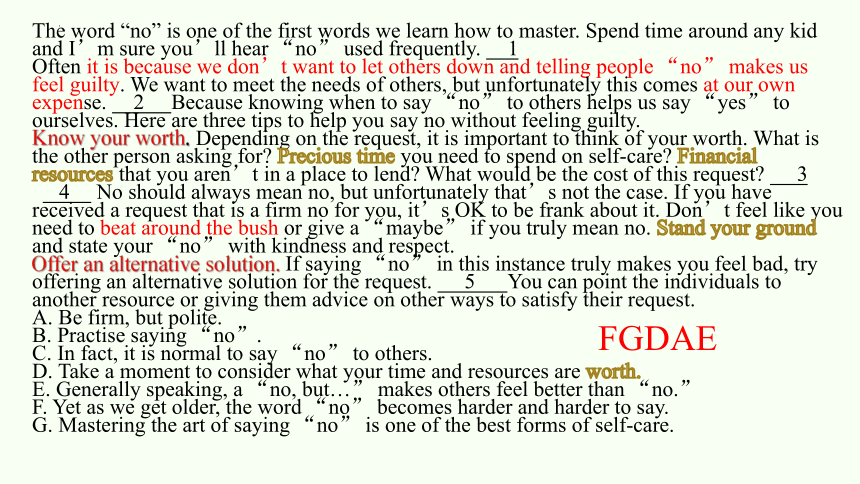
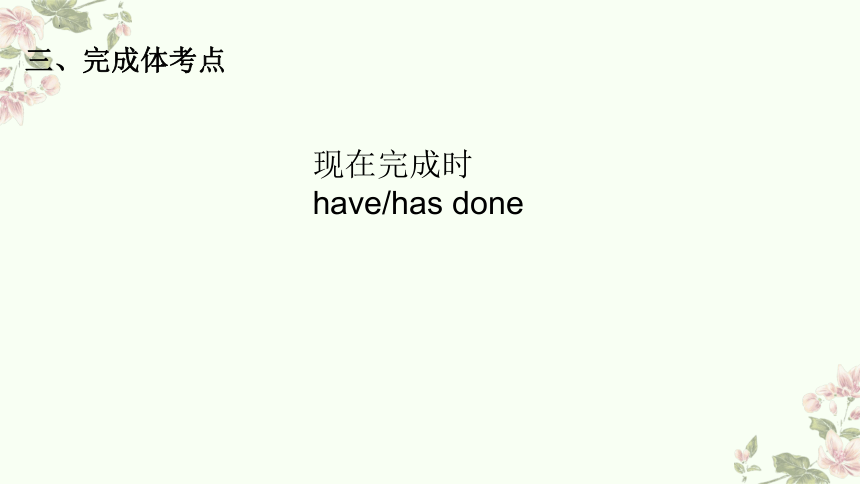
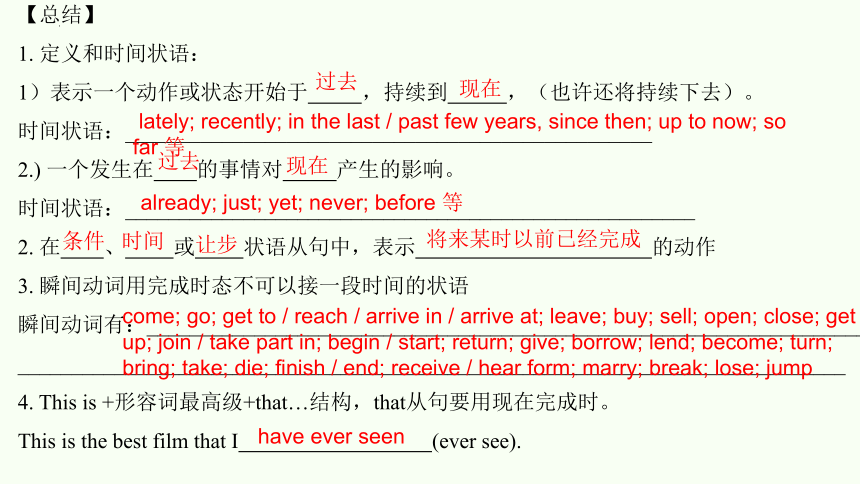

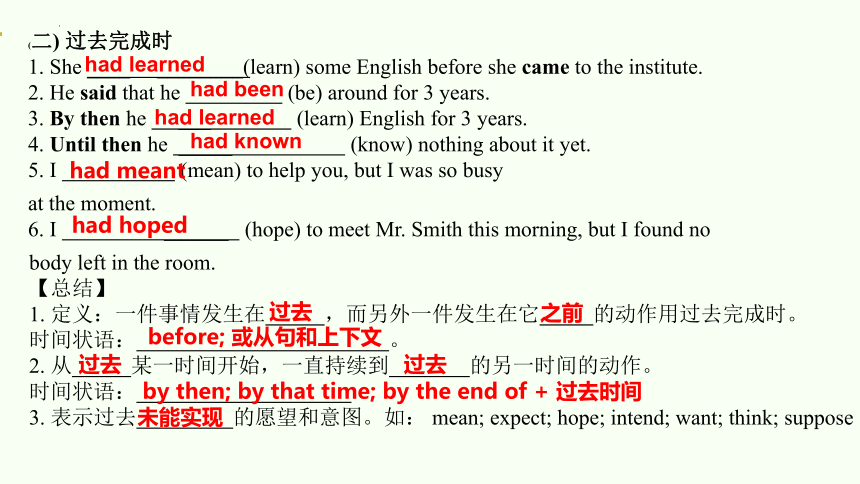
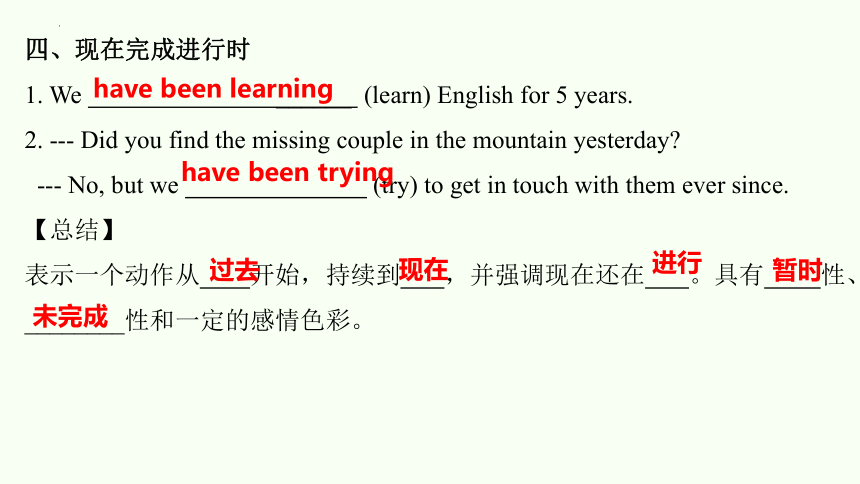
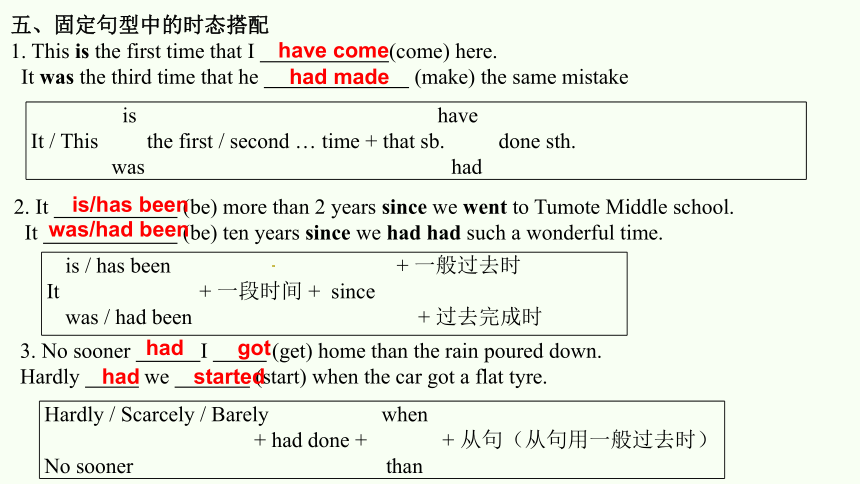
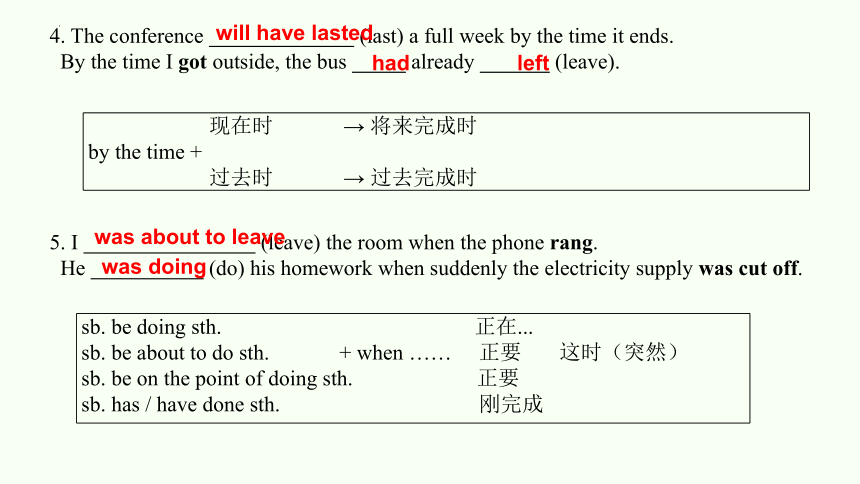
文档简介
(共20张PPT)
第五节 动词的时态
The word “no” is one of the first words we learn how to master. Spend time around any kid and I’m sure you’ll hear “no” used frequently. 1
Often it is because we don’t want to let others down and telling people “no” makes us feel guilty. We want to meet the needs of others, but unfortunately this comes at our own expense. 2 Because knowing when to say “no” to others helps us say “yes” to ourselves. Here are three tips to help you say no without feeling guilty.
Know your worth. Depending on the request, it is important to think of your worth. What is the other person asking for Precious time you need to spend on self-care Financial resources that you aren’t in a place to lend What would be the cost of this request 3
4 No should always mean no, but unfortunately that’s not the case. If you have received a request that is a firm no for you, it’s OK to be frank about it. Don’t feel like you need to beat around the bush or give a “maybe” if you truly mean no. Stand your ground and state your “no” with kindness and respect.
Offer an alternative solution. If saying “no” in this instance truly makes you feel bad, try offering an alternative solution for the request. 5 You can point the individuals to another resource or giving them advice on other ways to satisfy their request.
A. Be firm, but polite.
B. Practise saying “no”.
C. In fact, it is normal to say “no” to others.
D. Take a moment to consider what your time and resources are worth.
E. Generally speaking, a “no, but…” makes others feel better than “no.”
F. Yet as we get older, the word “no” becomes harder and harder to say.
G. Mastering the art of saying “no” is one of the best forms of self-care.
FGDAE
现在完成时
have/has done
三、完成体考点
【总结】
1. 定义和时间状语:
1)表示一个动作或状态开始于 ,持续到 ,(也许还将持续下去)。
时间状语:_________________________________________________
2.) 一个发生在 的事情对 产生的影响。
时间状语:_____________________________________________________
2. 在 、 或 状语从句中,表示 的动作
3. 瞬间动词用完成时态不可以接一段时间的状语
瞬间动词有:___________________________________________________________________
_____________________________________________________________________________
4. This is +形容词最高级+that…结构,that从句要用现在完成时。
This is the best film that I (ever see).
过去
现在
过去
现在
lately; recently; in the last / past few years, since then; up to now; so far 等
already; just; yet; never; before 等
条件
时间
让步
将来某时以前已经完成
come; go; get to / reach / arrive in / arrive at; leave; buy; sell; open; close; get up; join / take part in; begin / start; return; give; borrow; lend; become; turn; bring; take; die; finish / end; receive / hear form; marry; break; lose; jump
have ever seen
过去完成时
had done
三、完成体考点
(二) 过去完成时
1. She ____ ________(learn) some English before she came to the institute.
2. He said that he (be) around for 3 years.
3. By then he ___ (learn) English for 3 years.
4. Until then he _____ (know) nothing about it yet.
5. I (mean) to help you, but I was so busy
at the moment.
6. I ______ (hope) to meet Mr. Smith this morning, but I found no
body left in the room.
【总结】
1. 定义:一件事情发生在 ,而另外一件发生在它 的动作用过去完成时。
时间状语: 。
2. 从 某一时间开始,一直持续到 的另一时间的动作。
时间状语:
3. 表示过去 的愿望和意图。如: mean; expect; hope; intend; want; think; suppose
had learned
had been
had learned
had known
had meant
had hoped
过去
之前
过去
过去
before; 或从句和上下文
by then; by that time; by the end of + 过去时间
未能实现
四、现在完成进行时
1. We ______ (learn) English for 5 years.
2. --- Did you find the missing couple in the mountain yesterday
--- No, but we (try) to get in touch with them ever since.
【总结】
表示一个动作从 开始,持续到 ,并强调现在还在 。具有 性、________性和一定的感彩。
have been learning
have been trying
过去
现在
进行
未完成
暂时
is have
It / This the first / second … time + that sb. done sth.
was had
is / has been + 一般过去时
It + 一段时间 + since
was / had been + 过去完成时
五、固定句型中的时态搭配
1. This is the first time that I (come) here.
It was the third time that he (make) the same mistake
2. It (be) more than 2 years since we went to Tumote Middle school.
It (be) ten years since we had had such a wonderful time.
Hardly / Scarcely / Barely when
+ had done + + 从句(从句用一般过去时)
No sooner than
3. No sooner I (get) home than the rain poured down.
Hardly we (start) when the car got a flat tyre.
have come
had made
is/has been
was/had been
had got
had started
4. The conference (last) a full week by the time it ends.
By the time I got outside, the bus already (leave).
5. I (leave) the room when the phone rang.
He (do) his homework when suddenly the electricity supply was cut off.
现在时 → 将来完成时
by the time +
过去时 → 过去完成时
sb. be doing sth. 正在...
sb. be about to do sth. + when …… 正要 这时(突然)
sb. be on the point of doing sth. 正要
sb. has / have done sth. 刚完成
will have lasted
had left
was about to leave
was doing
It is the first time that sb has/have done sth.
It was the first time that sb had done sth
It is/has been .... since sb did sth /sth happened
It was/had been .... since sb had done sth /sth had happened.
Hardly had sb done sth when sth happened.
No sooner had sb done sth than sth happened.
现在时 → 将来完成时
by the time +
过去时 → 过去完成时
sb. be doing sth. 正在...
sb. be about to do sth. + when …… 正要 这时(突然)
sb. be on the point of doing sth. 正要
sb. has / have done sth. 刚完成
六、时态易混点
(一)一般过去时和现在完成时的区别:
1. I (read) the novel last month.
2. I ___ already __ (read) the novel written by the world-famous writer.
3. A: “________________(you / see) Lisa recently ”
B: “Yes, _______________(I / see) her a few days ago.
【总结】
1. 时“利用过去,说明现在”,不能同表示过去的时间状语连用。
2. 时“仅谈过去,不关现在”,可以和表示过去的时间状语连用。
read
have read
现在完成
一般过去
Have you seen
I saw
(二)一般过去时和过去完成时的区别
1. He ____________(learn) 3,000 English words before he _______(come) to this school last year.
2. --- Hurry up! Alice and Sue are waiting for you at the school gate.
--- Oh! I thought they ____________(go) without me.
【总结】
两种时态建立的时间参照点不同:一般过去时是对___________而言
过去完成时是对____________而言
(三)现在完成时和现在完成进行时的区别
1. I have read that book.
2. I have been reading that book all the morning.
现在
过去
had learned
came
had gone
(一)用括号内单词的适当形式填入句子。
1.— I called you at 4:00 yesterday afternoon, but no one answered.
— Sorry, I ________________ (swim) with my friends at that time.
2. — Excuse me, where is Mr. Brown's office
— Sorry, I don't know. I _______________(work) here for only a few days.
3. — Where is Bob
—He _________(go) to Harbin for a meeting.
4. Don't make so much noise. The children ____________(have) an English lesson.
5. I was very angry with John—he just ________________(not listen) when I spoke to him.
6. — Are you going to the bank, Laura
— No, I ____________(be) to the bank already.
7. Mr. Black is going to marry a girl he ____________(meet) in Japan last year.
8. So far this year, many new houses ________(build) in Wenchuan with the help of the government.
9. My grandmother ___________(see) a lot of changes in Tianjin since she came here.
10. The meeting ________________(begin) by the time I got there yesterday.
was swimming
have worked
has gone
are having
wasn’t listening
have been
met
have been built
has seen
had begun
(二)语篇填空
A funny thing happened to me the other day. I ________ (be) in a hurry to get to work and I found that my car wasn’t working. I ________ (have to) rush out of the house to catch the bus. While I __ ______ (walk) along the street, I ________ (notice) a woman of about my age on the opposite side of the road. I looked at her again and I ________ (realize) that we ________ (meet) before.
We both arrived at the bus stop. “Excuse me, have we met before I’m sure that I ________ (recognize) you,” I said to her. She looked a bit surprised, but she ________ (tell) me that her name was Angela Barker.
was
had to
was walking
noticed
realized
had met
recognize
told
studied
replied
do
do
work
live
have lived
have seen
were looking
“You ________ (study) history at Livepool University from 1985 to 1988!” I shouted. “That’s right!” she ________ (reply), “And you are Claire Lewis ” “Yes, yes! What ________ you ________ (do) nowadays ” I asked.
“Well, I ________ (work) in the Central Museum in town and I ________ (live) in this area, in George Street.” “You are joking! I ____ ____ (live) round the corner for about three years, but we ________ never ________(see) each other.” I said.
“It’s really amazing! And I’m glad that you spoke to me because I wondered why you ________ (look) at me all the time!”
动词的时态和语态
一般现在时 主语+do/does 经常性,习惯性,真理,状态
一般过去时 主语+did 过去的时间状语
一般将来时 主语+will do 临时决定 be going to do 迹象表明会发生。。
be doing 位移动词 be about to do ... when
be to do 注定要、一定要
一般现在时表将来 主将从现/时刻表上
过去将来时 主语+would do 间接引语/从句
现在进行时 主语+am/is/are doing 现阶段、此刻
过去进行时 主语+was/were doing 过去的点时间正在进行
现在完成时 主语+have/has done
already ever yet never so far just recently/lately up to now ever since
for+段时间 since+ 过去时间(一般过去时)in/over the last/past .....
过去完成时 主语+had done 在过去的某个时间之前发生的动作
It is the first time that sb has/have done
It was the first time that sb had done sth
将来完成时 主语+will have done by
现在完成进行时 主语+have been doing
动词的时态
一般现在时
一般过去时
一般将来时
过去将来时
现在进行时
过去进行时
现在完成时
过去完成时
主语+do/does
主语+did
主语+will/shall do
主语+would do
主语+am/is/are doing
主语+was/were doing
主语+have/has done
主语+had done
被动语态
英语动词有两种语态:主动语态和被动语态。
当我们不知道谁是动作的 ,
2. 或者只需强调动作的 时,要用被动语态。
被动语态结构:be + 过去分词(PP) + (by …)
执行者
承受者
时态 主动语态 被动语态结构 例句
一般现在时 do/does The trees are watered every day.
一般过去时 did They were praised by the professor.
现在进行时 am/is/are doing Some questions are being discussed now.
过去进行时 was/were doing They were being questioned when I came in.
一般将来时 shall/will/be going to do A meeting will be held tomorrow.
过去将来时 would do They said the problem would be solved soon.
现在完成时 have/has done Ten trees have been cut down since last Sunday.
过去完成时 had done He said that a plan had been made.
情态动词 情态动词+do Something must be done to protect the river.
am/is/are done
was/were done
am/is/are being done
was/were being done
shall/will/be going to be done
would be done
have/has been done
had been done
情态动词+be done
在改写中应注意:
1.把原来的宾语提到前面作被动语态的 ;
2.把动词变成“ ”;
3.主动语态中的主语变为介词 的宾语。
e.g. Some people attacked the towers.
S V O
The towers were attacked by some people.
S V
主语
be + 过去分词
by
谢谢!
第五节 动词的时态
The word “no” is one of the first words we learn how to master. Spend time around any kid and I’m sure you’ll hear “no” used frequently. 1
Often it is because we don’t want to let others down and telling people “no” makes us feel guilty. We want to meet the needs of others, but unfortunately this comes at our own expense. 2 Because knowing when to say “no” to others helps us say “yes” to ourselves. Here are three tips to help you say no without feeling guilty.
Know your worth. Depending on the request, it is important to think of your worth. What is the other person asking for Precious time you need to spend on self-care Financial resources that you aren’t in a place to lend What would be the cost of this request 3
4 No should always mean no, but unfortunately that’s not the case. If you have received a request that is a firm no for you, it’s OK to be frank about it. Don’t feel like you need to beat around the bush or give a “maybe” if you truly mean no. Stand your ground and state your “no” with kindness and respect.
Offer an alternative solution. If saying “no” in this instance truly makes you feel bad, try offering an alternative solution for the request. 5 You can point the individuals to another resource or giving them advice on other ways to satisfy their request.
A. Be firm, but polite.
B. Practise saying “no”.
C. In fact, it is normal to say “no” to others.
D. Take a moment to consider what your time and resources are worth.
E. Generally speaking, a “no, but…” makes others feel better than “no.”
F. Yet as we get older, the word “no” becomes harder and harder to say.
G. Mastering the art of saying “no” is one of the best forms of self-care.
FGDAE
现在完成时
have/has done
三、完成体考点
【总结】
1. 定义和时间状语:
1)表示一个动作或状态开始于 ,持续到 ,(也许还将持续下去)。
时间状语:_________________________________________________
2.) 一个发生在 的事情对 产生的影响。
时间状语:_____________________________________________________
2. 在 、 或 状语从句中,表示 的动作
3. 瞬间动词用完成时态不可以接一段时间的状语
瞬间动词有:___________________________________________________________________
_____________________________________________________________________________
4. This is +形容词最高级+that…结构,that从句要用现在完成时。
This is the best film that I (ever see).
过去
现在
过去
现在
lately; recently; in the last / past few years, since then; up to now; so far 等
already; just; yet; never; before 等
条件
时间
让步
将来某时以前已经完成
come; go; get to / reach / arrive in / arrive at; leave; buy; sell; open; close; get up; join / take part in; begin / start; return; give; borrow; lend; become; turn; bring; take; die; finish / end; receive / hear form; marry; break; lose; jump
have ever seen
过去完成时
had done
三、完成体考点
(二) 过去完成时
1. She ____ ________(learn) some English before she came to the institute.
2. He said that he (be) around for 3 years.
3. By then he ___ (learn) English for 3 years.
4. Until then he _____ (know) nothing about it yet.
5. I (mean) to help you, but I was so busy
at the moment.
6. I ______ (hope) to meet Mr. Smith this morning, but I found no
body left in the room.
【总结】
1. 定义:一件事情发生在 ,而另外一件发生在它 的动作用过去完成时。
时间状语: 。
2. 从 某一时间开始,一直持续到 的另一时间的动作。
时间状语:
3. 表示过去 的愿望和意图。如: mean; expect; hope; intend; want; think; suppose
had learned
had been
had learned
had known
had meant
had hoped
过去
之前
过去
过去
before; 或从句和上下文
by then; by that time; by the end of + 过去时间
未能实现
四、现在完成进行时
1. We ______ (learn) English for 5 years.
2. --- Did you find the missing couple in the mountain yesterday
--- No, but we (try) to get in touch with them ever since.
【总结】
表示一个动作从 开始,持续到 ,并强调现在还在 。具有 性、________性和一定的感彩。
have been learning
have been trying
过去
现在
进行
未完成
暂时
is have
It / This the first / second … time + that sb. done sth.
was had
is / has been + 一般过去时
It + 一段时间 + since
was / had been + 过去完成时
五、固定句型中的时态搭配
1. This is the first time that I (come) here.
It was the third time that he (make) the same mistake
2. It (be) more than 2 years since we went to Tumote Middle school.
It (be) ten years since we had had such a wonderful time.
Hardly / Scarcely / Barely when
+ had done + + 从句(从句用一般过去时)
No sooner than
3. No sooner I (get) home than the rain poured down.
Hardly we (start) when the car got a flat tyre.
have come
had made
is/has been
was/had been
had got
had started
4. The conference (last) a full week by the time it ends.
By the time I got outside, the bus already (leave).
5. I (leave) the room when the phone rang.
He (do) his homework when suddenly the electricity supply was cut off.
现在时 → 将来完成时
by the time +
过去时 → 过去完成时
sb. be doing sth. 正在...
sb. be about to do sth. + when …… 正要 这时(突然)
sb. be on the point of doing sth. 正要
sb. has / have done sth. 刚完成
will have lasted
had left
was about to leave
was doing
It is the first time that sb has/have done sth.
It was the first time that sb had done sth
It is/has been .... since sb did sth /sth happened
It was/had been .... since sb had done sth /sth had happened.
Hardly had sb done sth when sth happened.
No sooner had sb done sth than sth happened.
现在时 → 将来完成时
by the time +
过去时 → 过去完成时
sb. be doing sth. 正在...
sb. be about to do sth. + when …… 正要 这时(突然)
sb. be on the point of doing sth. 正要
sb. has / have done sth. 刚完成
六、时态易混点
(一)一般过去时和现在完成时的区别:
1. I (read) the novel last month.
2. I ___ already __ (read) the novel written by the world-famous writer.
3. A: “________________(you / see) Lisa recently ”
B: “Yes, _______________(I / see) her a few days ago.
【总结】
1. 时“利用过去,说明现在”,不能同表示过去的时间状语连用。
2. 时“仅谈过去,不关现在”,可以和表示过去的时间状语连用。
read
have read
现在完成
一般过去
Have you seen
I saw
(二)一般过去时和过去完成时的区别
1. He ____________(learn) 3,000 English words before he _______(come) to this school last year.
2. --- Hurry up! Alice and Sue are waiting for you at the school gate.
--- Oh! I thought they ____________(go) without me.
【总结】
两种时态建立的时间参照点不同:一般过去时是对___________而言
过去完成时是对____________而言
(三)现在完成时和现在完成进行时的区别
1. I have read that book.
2. I have been reading that book all the morning.
现在
过去
had learned
came
had gone
(一)用括号内单词的适当形式填入句子。
1.— I called you at 4:00 yesterday afternoon, but no one answered.
— Sorry, I ________________ (swim) with my friends at that time.
2. — Excuse me, where is Mr. Brown's office
— Sorry, I don't know. I _______________(work) here for only a few days.
3. — Where is Bob
—He _________(go) to Harbin for a meeting.
4. Don't make so much noise. The children ____________(have) an English lesson.
5. I was very angry with John—he just ________________(not listen) when I spoke to him.
6. — Are you going to the bank, Laura
— No, I ____________(be) to the bank already.
7. Mr. Black is going to marry a girl he ____________(meet) in Japan last year.
8. So far this year, many new houses ________(build) in Wenchuan with the help of the government.
9. My grandmother ___________(see) a lot of changes in Tianjin since she came here.
10. The meeting ________________(begin) by the time I got there yesterday.
was swimming
have worked
has gone
are having
wasn’t listening
have been
met
have been built
has seen
had begun
(二)语篇填空
A funny thing happened to me the other day. I ________ (be) in a hurry to get to work and I found that my car wasn’t working. I ________ (have to) rush out of the house to catch the bus. While I __ ______ (walk) along the street, I ________ (notice) a woman of about my age on the opposite side of the road. I looked at her again and I ________ (realize) that we ________ (meet) before.
We both arrived at the bus stop. “Excuse me, have we met before I’m sure that I ________ (recognize) you,” I said to her. She looked a bit surprised, but she ________ (tell) me that her name was Angela Barker.
was
had to
was walking
noticed
realized
had met
recognize
told
studied
replied
do
do
work
live
have lived
have seen
were looking
“You ________ (study) history at Livepool University from 1985 to 1988!” I shouted. “That’s right!” she ________ (reply), “And you are Claire Lewis ” “Yes, yes! What ________ you ________ (do) nowadays ” I asked.
“Well, I ________ (work) in the Central Museum in town and I ________ (live) in this area, in George Street.” “You are joking! I ____ ____ (live) round the corner for about three years, but we ________ never ________(see) each other.” I said.
“It’s really amazing! And I’m glad that you spoke to me because I wondered why you ________ (look) at me all the time!”
动词的时态和语态
一般现在时 主语+do/does 经常性,习惯性,真理,状态
一般过去时 主语+did 过去的时间状语
一般将来时 主语+will do 临时决定 be going to do 迹象表明会发生。。
be doing 位移动词 be about to do ... when
be to do 注定要、一定要
一般现在时表将来 主将从现/时刻表上
过去将来时 主语+would do 间接引语/从句
现在进行时 主语+am/is/are doing 现阶段、此刻
过去进行时 主语+was/were doing 过去的点时间正在进行
现在完成时 主语+have/has done
already ever yet never so far just recently/lately up to now ever since
for+段时间 since+ 过去时间(一般过去时)in/over the last/past .....
过去完成时 主语+had done 在过去的某个时间之前发生的动作
It is the first time that sb has/have done
It was the first time that sb had done sth
将来完成时 主语+will have done by
现在完成进行时 主语+have been doing
动词的时态
一般现在时
一般过去时
一般将来时
过去将来时
现在进行时
过去进行时
现在完成时
过去完成时
主语+do/does
主语+did
主语+will/shall do
主语+would do
主语+am/is/are doing
主语+was/were doing
主语+have/has done
主语+had done
被动语态
英语动词有两种语态:主动语态和被动语态。
当我们不知道谁是动作的 ,
2. 或者只需强调动作的 时,要用被动语态。
被动语态结构:be + 过去分词(PP) + (by …)
执行者
承受者
时态 主动语态 被动语态结构 例句
一般现在时 do/does The trees are watered every day.
一般过去时 did They were praised by the professor.
现在进行时 am/is/are doing Some questions are being discussed now.
过去进行时 was/were doing They were being questioned when I came in.
一般将来时 shall/will/be going to do A meeting will be held tomorrow.
过去将来时 would do They said the problem would be solved soon.
现在完成时 have/has done Ten trees have been cut down since last Sunday.
过去完成时 had done He said that a plan had been made.
情态动词 情态动词+do Something must be done to protect the river.
am/is/are done
was/were done
am/is/are being done
was/were being done
shall/will/be going to be done
would be done
have/has been done
had been done
情态动词+be done
在改写中应注意:
1.把原来的宾语提到前面作被动语态的 ;
2.把动词变成“ ”;
3.主动语态中的主语变为介词 的宾语。
e.g. Some people attacked the towers.
S V O
The towers were attacked by some people.
S V
主语
be + 过去分词
by
谢谢!
同课章节目录
- 词法
- 名词
- 动词和动词短语
- 动词语态
- 动词时态
- 助动词和情态动词
- 非谓语动词
- 冠词
- 代词
- 数词和量词
- 形容词副词及其比较等级
- 介词和介词短语
- 连词和感叹词
- 构词法
- 相似、相近词比较
- 句法
- 陈述句
- 一般疑问句和否定疑问句
- 特殊疑问句及选择疑问句
- 反意疑问句
- 存在句(There be句型)
- 宾语从句
- 定语从句
- 状语从句
- 主谓一致问题
- 简单句
- 并列句
- 复合句
- 主谓一致
- 主、表语从句
- 名词性从句
- 直接引语和间接引语
- 虚拟语气
- 感叹句
- 强调句
- 倒装句
- 祈使句
- 句子的成分
- 句子的分类
- 题型专区
- 单项选择部分
- 易错题
- 完形填空
- 阅读理解
- 词汇练习
- 听说训练
- 句型转换
- 补全对话
- 短文改错
- 翻译
- 书面表达
- 任务型阅读
- 语法填空
- 其他资料
